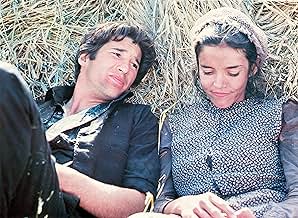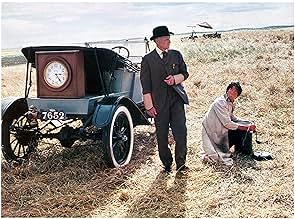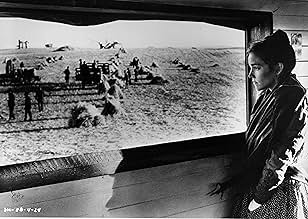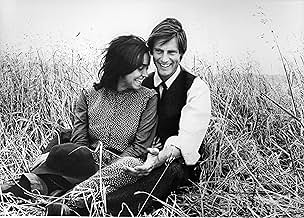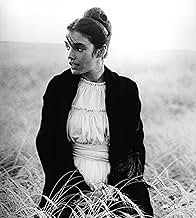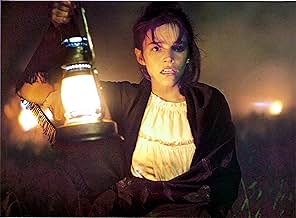Un ouvrier agricole intempestif convainc la femme qu'il aime, d'épouser leur riche patron mourant, afin de pouvoir prétendre à l'héritage de sa fortune.Un ouvrier agricole intempestif convainc la femme qu'il aime, d'épouser leur riche patron mourant, afin de pouvoir prétendre à l'héritage de sa fortune.Un ouvrier agricole intempestif convainc la femme qu'il aime, d'épouser leur riche patron mourant, afin de pouvoir prétendre à l'héritage de sa fortune.
- Réalisation
- Scénario
- Casting principal
- Récompensé par 1 Oscar
- 13 victoires et 13 nominations au total
Robert J. Wilke
- The Farm Foreman
- (as Robert Wilke)
Timothy Scott
- Harvest Hand
- (as Tim Scott)
Terrence Malick
- Mill Worker
- (non crédité)
Avis à la une
This is truly a unique movie: in a class by itself. I had that opinion the first time I saw it on VHS and still feel the same way years later. It's been at the top of my list of favorite movies since I began compiling a list over a decade ago.
It's very dream-like, surreal, a film I never get tired of watching and I've watched this film more than any other in my large collection. If I had to pin it down to two reasons why, it would be the video and the audio.
The cinematography alone makes this movie worth watching repeatedly. Now that we all have access to a widescreen DVD version of this, the scenes are even more breathtaking. (I never had the pleasure of seeing this in a movie theater.)
The same superlatives can be used when discussing the soundtrack, a haunting music score that gets better and better each time one views this film. In fact, lately it's the music more than anything else I miss when I go periods without viewing this film.
The story is a simple one and is explained by others here. No need to repeat it. I find the narration to be unique, an unusual insight into the characters of the film and the thoughts of the little girl (Linda Manz), who does the narrating. The characters that continually fascinate me are Brooke Adams, as the lead female, and Robert J. Wilke, as the farm foreman. I guess it's their faces that intrigue me. Adams' down-turned mouth and sad look and Wilke's wrinklies catch my attention every time.
The story is interesting, generally low-key but with a few quick violent scenes that are quite memorable. More than that, one gets an incredible feel for the land and for the migrant workers of that time period. Another nice aspect of this film is the very small amount of profanity. Kids probably would be bored with this film but at least I wouldn't be afraid to show it to them.
But as many pluses as the story boasts, that haunting music and those incredible visuals are what drive me back for more. Great, great stuff.
It's very dream-like, surreal, a film I never get tired of watching and I've watched this film more than any other in my large collection. If I had to pin it down to two reasons why, it would be the video and the audio.
The cinematography alone makes this movie worth watching repeatedly. Now that we all have access to a widescreen DVD version of this, the scenes are even more breathtaking. (I never had the pleasure of seeing this in a movie theater.)
The same superlatives can be used when discussing the soundtrack, a haunting music score that gets better and better each time one views this film. In fact, lately it's the music more than anything else I miss when I go periods without viewing this film.
The story is a simple one and is explained by others here. No need to repeat it. I find the narration to be unique, an unusual insight into the characters of the film and the thoughts of the little girl (Linda Manz), who does the narrating. The characters that continually fascinate me are Brooke Adams, as the lead female, and Robert J. Wilke, as the farm foreman. I guess it's their faces that intrigue me. Adams' down-turned mouth and sad look and Wilke's wrinklies catch my attention every time.
The story is interesting, generally low-key but with a few quick violent scenes that are quite memorable. More than that, one gets an incredible feel for the land and for the migrant workers of that time period. Another nice aspect of this film is the very small amount of profanity. Kids probably would be bored with this film but at least I wouldn't be afraid to show it to them.
But as many pluses as the story boasts, that haunting music and those incredible visuals are what drive me back for more. Great, great stuff.
This is gorgeous looking film very much filmed at dusk and dawn. A film misunderstood upon its time of release and only after Terrence Malick's subsequent films can you now understand what the writer- director was aiming at.
The fact that Malick's next film emerged 20 years later we understand this is a person who wants to tell his story by visuals. Actors talking is just secondary and those scenes end up on the cutting room floor.
Days of Heaven which was shot in 70mm always had a reputation for its Cinematography which won an Oscar.
Now we can marvel at it in our homes on widescreen high definition television. You can really have those close ups of those insects. It is also a surprisingly short film, coming in at just over 90 minutes.
The tale is slight, Gere is a hothead with a girlfriend that is pretending to be his sister and his actual younger sister. They get a job whilst fleeing from Chicago in a farm in Texas where the Farmer played by Sam Shepard takes a shine to the girlfriend and marries her. Gere is aware that the Framer only has a year to live.
Apparently the film took several years to be edited and the narration from the youngest sister had to be added to make the story flow. A similar device was used by Malick in 'The Thin Red Line.'
The film might be seen as slow and maybe hard to fathom because there is relative little dialogue but as mentioned you admire the visuals and at 90 minutes it is not as slow moving as you think.
A brave beautifully crafted film.
The fact that Malick's next film emerged 20 years later we understand this is a person who wants to tell his story by visuals. Actors talking is just secondary and those scenes end up on the cutting room floor.
Days of Heaven which was shot in 70mm always had a reputation for its Cinematography which won an Oscar.
Now we can marvel at it in our homes on widescreen high definition television. You can really have those close ups of those insects. It is also a surprisingly short film, coming in at just over 90 minutes.
The tale is slight, Gere is a hothead with a girlfriend that is pretending to be his sister and his actual younger sister. They get a job whilst fleeing from Chicago in a farm in Texas where the Farmer played by Sam Shepard takes a shine to the girlfriend and marries her. Gere is aware that the Framer only has a year to live.
Apparently the film took several years to be edited and the narration from the youngest sister had to be added to make the story flow. A similar device was used by Malick in 'The Thin Red Line.'
The film might be seen as slow and maybe hard to fathom because there is relative little dialogue but as mentioned you admire the visuals and at 90 minutes it is not as slow moving as you think.
A brave beautifully crafted film.
Oh, I better come out and say it: I love Terrence Malick. I think he's one of the few filmmakers who has completely and utterly captured filmic form. "The Thin Red Line" was, to me, an astonishing experience; beautiful, horrific and the best movie of the 90s. "Badlands" is the best lovers-on-the-lam movie I've ever seen (it certainly makes "True Romance" look like a gimmicky fraud of a movie). Malick somehow manages to make everything seem painfully beautiful: his landscape, his actors, his dialogue. There's something always elegiac about his movies.
There's a picture of James Dean I saw from his youth -- a baseball team photo -- and the caption said something about how it captured his face, and in it, wisdom and sadness far beyond his years. That's what Malick does in his films and particularly in this film.
He must have been a fan of James Dean (probably one of the reasons he chose to make "Badlands," as a sort of homage), but not in the sense that coolness comes from a perfectly combed coiffure, a red leather jacket (which it wasn't -- it was a windbreaker) and a dark brood. There's a similar story here to that of "Giant," set on a farm with that remarkable house, two men and one girl. Only "Giant" didn't have a philosophizing and very strange little girl. It was also an overblown soap opera and while this film is, I guess, a melodrama, it certainly isn't melodramatic.
If Malick is anyone in the film, he's Sam Shapard; watching his love through a lens. Malick uses Manz as a sort of channel. If this is indeed some fashion of his own story, Malick tells us through her, with he visualized by Shepard, which is a somewhat brilliant approach. Manz is strangely philosophical; at once blunt and abstract. The story is obviously centered around her -- I don't see why this wouldn't be obvious -- but she's pushed into the background, commenting on the characters and informing us like God from above.
As always with Malick, his film is mesmerizing and hypnotic. I was surprised that the film was only a little over an hour-and-a-half. The great Ennio Morricone created a wonderful score for this film that seems to forebode impending doom. Unlike his more famous spaghetti western scores, it's never overly-flamboyant. And the cinematography, listed as belonging to Nestor Almendros, but well-known to be at least substantially contributed to by Haskell Wexler, is so much like an oil painting that it's just about liquid film. I'd be willing to pay a lot of money to see this one on the big screen.
It might seem obvious to state that this film is a transition between "Badlands" and "The Thin Red Line," after all it was the middle film. But this film has moments, especially in the finale, that are surprisingly close to that of "Badlands" and this is the film where Malick fully mastered his approach of lush, visual poetry told at a languid pace that never seems boring, since you're fully within the film;s grasp.
Pauline Kael said in her review that "the film is an empty Christmas tree: you can hang all your dumb metaphors on it." And Charles Taylor, always following Kael's lead (even from beyond the grave), said of Malick's two 1970s films, "Next to the work of Altman, Scorsese, Coppola, De Palma and Mazursky from that period, they're pallid jokes."
What never fails to get me furious is when someone viciously attacks a director, like Malick, for being self-indulgent. Of course it's self-indulgent, he's telling a story that means something to him and trying to share what he feels with us. Malick certainly isn't trying to alienate people, and if you are alienated by his films, well, don't watch them. Malick is a filmmaker like Kubrick, but more fluid and much less abrasive. I mean, if you're going to aggressively attack a filmmaker, aggressively attack someone who is aggressive on his side. Directors like Malick use abstractions to engage their audiences more fully than most. By leaving things -- often feelings -- open to interpretation, the film becomes more intimate.
Certainly one of the most enduring films from the 70s, this is a masterwork.
****
There's a picture of James Dean I saw from his youth -- a baseball team photo -- and the caption said something about how it captured his face, and in it, wisdom and sadness far beyond his years. That's what Malick does in his films and particularly in this film.
He must have been a fan of James Dean (probably one of the reasons he chose to make "Badlands," as a sort of homage), but not in the sense that coolness comes from a perfectly combed coiffure, a red leather jacket (which it wasn't -- it was a windbreaker) and a dark brood. There's a similar story here to that of "Giant," set on a farm with that remarkable house, two men and one girl. Only "Giant" didn't have a philosophizing and very strange little girl. It was also an overblown soap opera and while this film is, I guess, a melodrama, it certainly isn't melodramatic.
If Malick is anyone in the film, he's Sam Shapard; watching his love through a lens. Malick uses Manz as a sort of channel. If this is indeed some fashion of his own story, Malick tells us through her, with he visualized by Shepard, which is a somewhat brilliant approach. Manz is strangely philosophical; at once blunt and abstract. The story is obviously centered around her -- I don't see why this wouldn't be obvious -- but she's pushed into the background, commenting on the characters and informing us like God from above.
As always with Malick, his film is mesmerizing and hypnotic. I was surprised that the film was only a little over an hour-and-a-half. The great Ennio Morricone created a wonderful score for this film that seems to forebode impending doom. Unlike his more famous spaghetti western scores, it's never overly-flamboyant. And the cinematography, listed as belonging to Nestor Almendros, but well-known to be at least substantially contributed to by Haskell Wexler, is so much like an oil painting that it's just about liquid film. I'd be willing to pay a lot of money to see this one on the big screen.
It might seem obvious to state that this film is a transition between "Badlands" and "The Thin Red Line," after all it was the middle film. But this film has moments, especially in the finale, that are surprisingly close to that of "Badlands" and this is the film where Malick fully mastered his approach of lush, visual poetry told at a languid pace that never seems boring, since you're fully within the film;s grasp.
Pauline Kael said in her review that "the film is an empty Christmas tree: you can hang all your dumb metaphors on it." And Charles Taylor, always following Kael's lead (even from beyond the grave), said of Malick's two 1970s films, "Next to the work of Altman, Scorsese, Coppola, De Palma and Mazursky from that period, they're pallid jokes."
What never fails to get me furious is when someone viciously attacks a director, like Malick, for being self-indulgent. Of course it's self-indulgent, he's telling a story that means something to him and trying to share what he feels with us. Malick certainly isn't trying to alienate people, and if you are alienated by his films, well, don't watch them. Malick is a filmmaker like Kubrick, but more fluid and much less abrasive. I mean, if you're going to aggressively attack a filmmaker, aggressively attack someone who is aggressive on his side. Directors like Malick use abstractions to engage their audiences more fully than most. By leaving things -- often feelings -- open to interpretation, the film becomes more intimate.
Certainly one of the most enduring films from the 70s, this is a masterwork.
****
10katsat
If any movie could be called filmed poetry, this would be it. From its first opening shot to its last frame, there is such lyricism and emotion and beauty that it almost leaves you speechless. I have not seen this movie in years, but it still affects me and I want to write about it. There is a pervading sadness to the movie, like a memory of something wonderful that could have been, that should have been, that almost was, and is all the more tragic because it was in your hands but slipped through your fingers. This is not a movie for everyone, but if you believe that film can be one of the highest forms of art, this is the film to see.
Days of heaven is exactly what this is. The magic hour (when much of the film was shot), those moments before dawn and after dusk when everything is indirect, dreamlike, breathless, heartwaking. There's no real story, as such. Sure, there's a general plot line which should satisfy any casual viewer. This isn't, after all, a hard film to follow. It is simply that the environment is the main character as opposed to the human elements. Linda Manz's young character narrates the story sporadically, like a sleepy traveler beside the campfire telling you of half-forgotten memories, and wonderful, casual observations that will seem clearer in the morning light, but no longer worth mentioning. Her voice is halting and uncertain, belying a personality that is confident in all other respects. Other actors, good (Brooke Adams, Sam Shepard) and not-so-good (Richard Gere) blend in perfectly. Their performances are so understated that you forget they are actors playing characters. Even Richard Gere, who never learned subtlety and would never again employ it, is almost invisible here.
This is not a long film. For all its leisurely pace, ninety-six minutes is all it needs to tell its tale. Terrence Malick is out for sight and sound. There is nothing lost to unneeded expression, nothing not shared in the space in front of you. That leaves cinematographer Néstor Almendros with the freedom to photograph, to observe without opinion whatever seems to be happening most openly before him.
When I first finished watching "Days of Heaven" it felt like waking from a dream. I couldn't be sure how much time has passed. It seemed so long, but the silence was the same, and little had changed outside my window. Nothing but the heavy quiet was all around me, and I felt the desperate desire to move. Everything beneath my feet felt moving, quietly slipping past and all I had to do was put soles to earth and start walking. This is a film of photographs, images of the purest sort. Open your eyes.
This is not a long film. For all its leisurely pace, ninety-six minutes is all it needs to tell its tale. Terrence Malick is out for sight and sound. There is nothing lost to unneeded expression, nothing not shared in the space in front of you. That leaves cinematographer Néstor Almendros with the freedom to photograph, to observe without opinion whatever seems to be happening most openly before him.
When I first finished watching "Days of Heaven" it felt like waking from a dream. I couldn't be sure how much time has passed. It seemed so long, but the silence was the same, and little had changed outside my window. Nothing but the heavy quiet was all around me, and I felt the desperate desire to move. Everything beneath my feet felt moving, quietly slipping past and all I had to do was put soles to earth and start walking. This is a film of photographs, images of the purest sort. Open your eyes.
Le saviez-vous
- AnecdotesThe shot of locusts ascending to the sky was shot in reverse with the helicopter crew throwing peanut shells down, and actors walking backwards.
- GaffesTowards the end of the movie, Bill fires three shots from a double-barreled shotgun without reloading.
- Bandes originalesEnderlin
Written and Performed by Leo Kottke
Used by permission of Overdrive Music A.S.C.A.P. Copyright 1978
Meilleurs choix
Connectez-vous pour évaluer et suivre la liste de favoris afin de recevoir des recommandations personnalisées
- How long is Days of Heaven?Alimenté par Alexa
Détails
- Date de sortie
- Pays d’origine
- Langues
- Aussi connu sous le nom de
- Días de gloria
- Lieux de tournage
- Lethbridge, Alberta, Canada(Lethbridge Viaduct High Level Railroad Bridge)
- Société de production
- Voir plus de crédits d'entreprise sur IMDbPro
Box-office
- Budget
- 3 000 000 $US (estimé)
- Montant brut aux États-Unis et au Canada
- 3 446 749 $US
- Montant brut mondial
- 3 492 909 $US
- Durée1 heure 34 minutes
- Couleur
- Rapport de forme
- 1.85 : 1
Contribuer à cette page
Suggérer une modification ou ajouter du contenu manquant

Lacune principale
What is the streaming release date of Les moissons du ciel (1978) in Brazil?
Répondre



